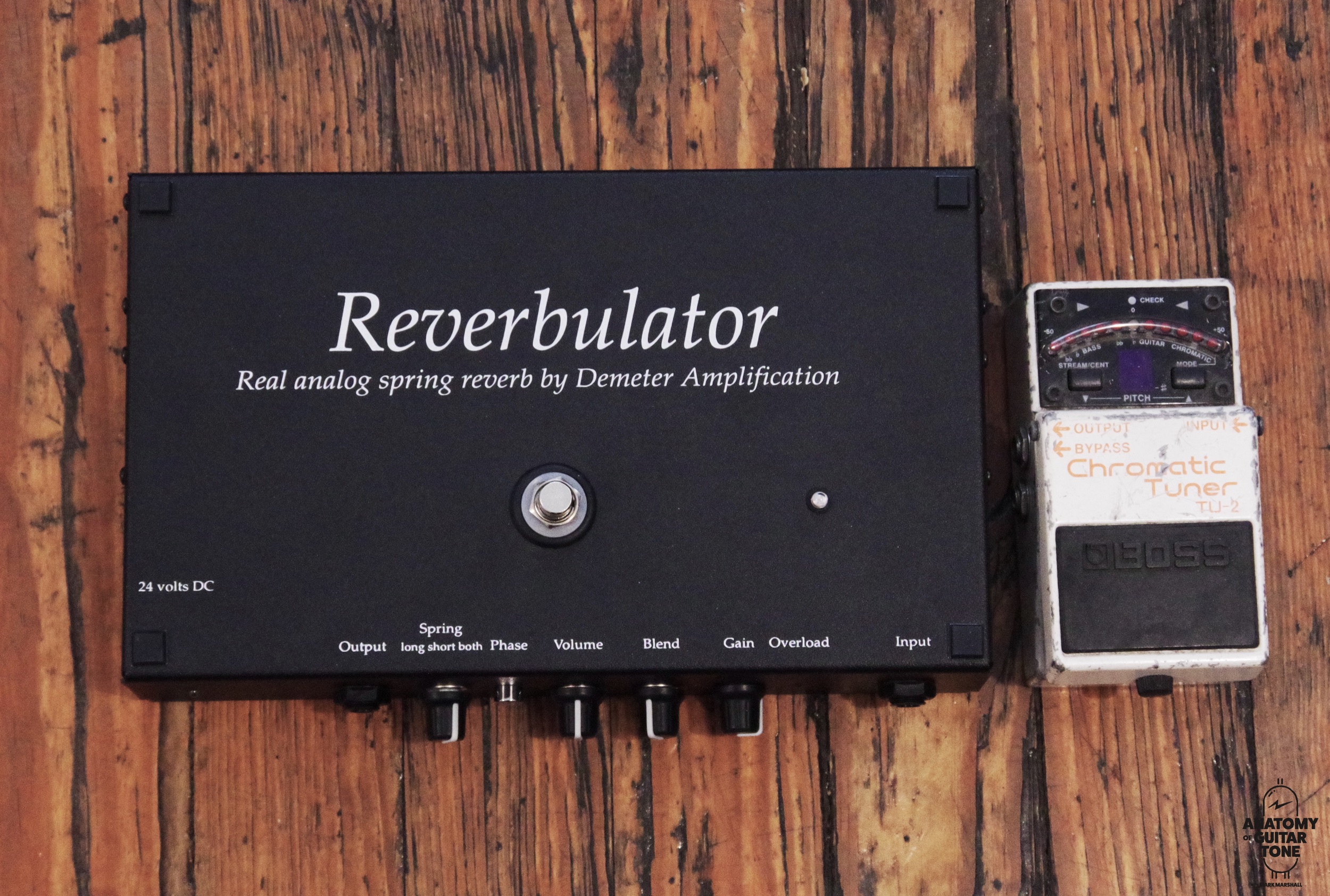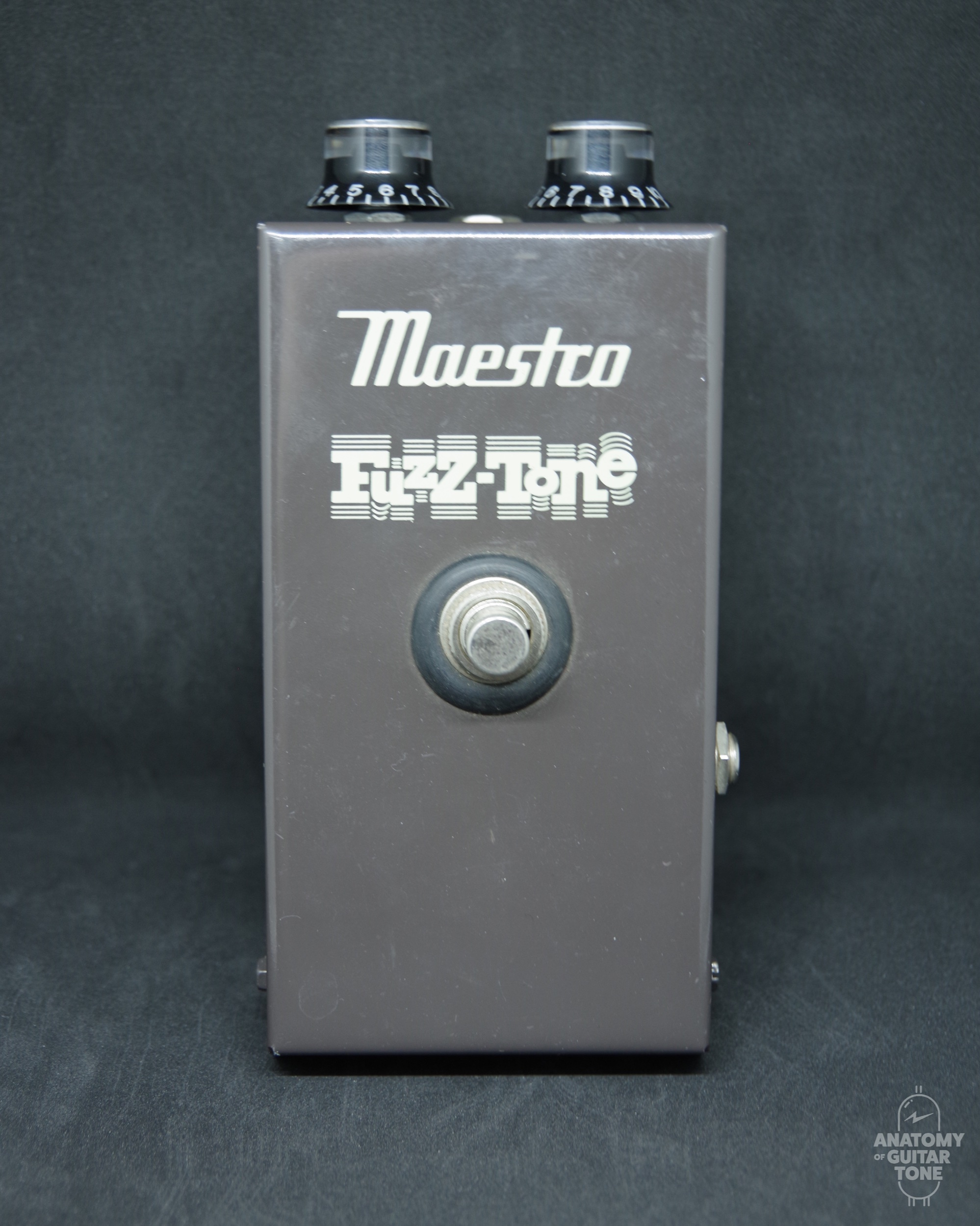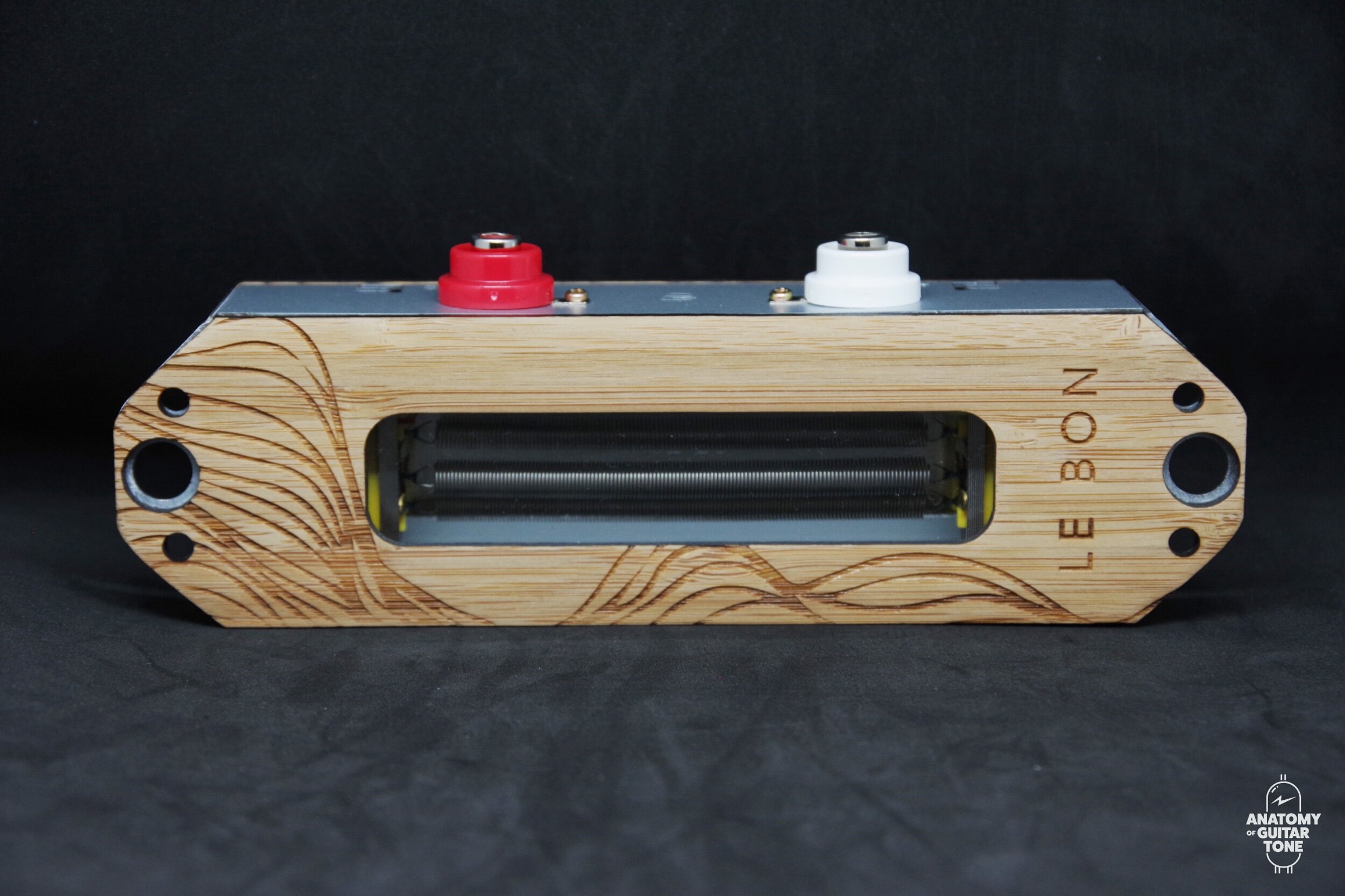Demeter Reverbulator Analog Spring Reverb Pedal
I’m a big ol’ fan of spring reverb. I don’t always use spring reverb, but when I do I tend to be pretty particular about it. I never have bonded with digital emulations of spring reverb. There is just something about the interaction of the guitar, the amp, and the springs that needs to happen in real time.
Using a digital spring reverb on an important gig or session is like taking your partner to the Taco Bell drive-through for your anniversary. Don’t try this at home, kids!
Cool surprises just seem to happen with real reverbs. Plus, the tone of the springs is dynamic, changing to the level that you’re pushing the guitar amp.
But what do you do when you don’t have spring reverb on your guitar amp? You need an outboard solution. This doesn’t mean you have to compromise on a digital reverb though.
Demeter makes a fully analog spring reverb called the Reverbulator. Inside you’ll find two sets of springs, giving you three spring selections.
You can choose long spring, the short spring, or both. I love all three options equally. This pedal just sounds great no matter what setting you choose.
Preamp
I have also found that I’m pretty particular about the preamps in analog reverb pedals. Each has a different flavor. I have played some that I just didn’t jive with.
Demeter did it right, though. Not really a surprise, since they are an amp maker. The preamp tone is flattering. And it includes the option for input gain and output gain, so if we’re using low-output pickups but want to push the springs, we can increase the input gain. This is a nice feature and even includes a light to let you know if you’re clipping the preamp.
“I would say the Reverbulator’s EQ character is richer than most Fender tanks”
There certainly is plenty of gain on the output. You can push the front end of an amp with it if you wish. This is different from some of the other real spring reverb pedals I have tried.
For instance the Anasounds Element has a volume knob to make up for lost gain, but it doesn’t really allow you to get above unity gain with a medium reverb tone. The Reverbulator has much more output gain.
EQ
There are no EQ options on the Reverbulator. I would say it’s a little darker than the reverb in my Headstrong Lil’ King Reverb, which is a Bblackface Princeton reverb circuit.
Various Fender Amps with Reverb
One thing to remember is that the reverbs sounded different in each of the Fender Reverb amp models. You will find players who love the reverb in a Princeton Reverb but don’t like it in a Deluxe Reverb.
I would say the Reverbulator’s EQ character is richer than most Fender tanks. It’s never harsh, even when you really drown your guitar in it.
And it doesn’t take over your sound at moderate settings. I find myself using more reverb on the Reverbulator than on other verbs. I can get away with it without the reverb strong-arming my signal. It’s a really pleasing reverb!
Max Headroom
The Demeter Reverbulator definitely has more headroom than other pedal spring reverbs. It runs at 24v, so it has that extra clean headroom. This does mean, however, that you’ll need to use a wal-wart with it. There aren’t a lot of power supplies with a 24v option.
“The Demeter Reverbulator definitely has more headroom than other pedal spring reverbs.”
I’m used to this—a lot of my favorite pedals run at higher voltage. Seems like I’m really into that extra headroom. Given the option to run certain pedals at 9v or 18v, I almost always choose 18v. Note: Make sure your pedal can accept voltage higher than 9v. It’s not something you want to experiment with, as it can destroy your pedal.
Life Partners
You have to commit to using this pedal. It’s rather large (because it has actual springs in it, hello) and requires its own power supply.
But spring reverb is one of those effects you can’t fake. So the commitment isn’t really that big a deal compared to the resulting sound. When I’m putting a board together using the Demeter Reverbulator I’m not anticipating turning it on for one song. It’s part of my sound. So I make it work and I’m always glad I did. Those little nano pedals can stay where they belong, in the toy section!
“When reverb is a featured part of the sound, the shortcomings of digital get spotlighted”
That’s where I think the divide is between analog and digital reverb. When you just need to drop in a reverb for a quick effect, you can get away with a digital spring. And that’s definitely more practical sometimes. But when reverb is a featured part of the sound, the shortcomings of digital get spotlighted.
Victoria 518 Tweed Amp
This is often the case for me. I use a lot of non-master volume amps. It just so happened I love Tweed Fender amps and Marshall Plexis. I use many other amps, too, but there are times that I need a real spring sound with a tweed or a Plexi. The Demeter shines in these situations.
Chameleon
Spring reverb is mostly associated with surf guitar. But there are many more appropriate situations for spring reverb. I have actually found the Reverbulator to be the most flexible of the spring reverbs I use.
You can conjure traditional surfy tones, but it equally excels at ambient tones as well as pop. It’s a pretty universal spring reverb, without being generic or lacking character. It’s inspired me to play things I never would have associated with a spring.
Elder
Demeter has been around for quite some time. I would say it was part of the first wave of boutique builders. Back when most options for amps and pedals came from bigger companies, Demeter was making pedals and amps that Bonnie Raitt and Dean DeLeo (Stone Temple Pilots) were using.
They saw a wave of guitarists wanting to elevate their sound. Where guitarists wanted more refinement in their gear.
Nowadays that doesn’t seem like such a strange idea. The market is saturated with small builders of varying quality. But Demeter laid a lot of that groundwork, with a lot of quality control and integrity.
I spoke to James Demeter about the Reverbulator and Demeter. Let’s hear what he had to say.
MM: Were you inspired by any particular spring reverb in your creation of the Reverbulator?
James Demeter: Oddly enough, the inspiration came from My RV-1 Stereo Studio spring reverb. I wanted to bring the hi-fi studio sound to the pedal world.
Me: How much thought was put into the preamp inside the Reverbulator?
James Demeter: A lot of thought was put into it. I made tube versions as well. The final circuit uses feedback through the the drive coil of the reverb itself to create a flatter response. We use Burr-Brown ICs in the unit, too—something not usually found in the pedal world. Also we use a 24v power supply to give added headroom and allow line level use.
Me: What are you favorite amps to pair with the Reverbulator? Yours and others.
James Demeter: My amps through the effects loop. I also love it with my ’61 Fender Bassman.
Me: What’s the difference between power and running a spring reverb at a higher voltage? Is there a considerable amount of extra headroom?
James Demeter: Headroom equals hi-fi.
Me: The option to combine two different sets of springs is unique. What led you to this?
James Demeter: I love lots flavors in the sound, and two sets of springs seemed like a good way to achieve it. My RV-1 Studio Reverb also has this function, which I wanted to include in the pedal.
Me: You were one of the early pioneers of boutique amps and pedals. Now there are quite a few in the market. How hard is it to stay visible these days, even with your legacy?
James Demeter: It’s very difficult for us to stay visible in this market. The pedal end of our business has declined quite a bit in recent years. My philosophy of building a product as close to perfect as possible and to make it so it will work for fifty years is lost in the noise.
Me: It’s common for some pedal makers to release something new every six months to stay current. I would rather someone make fewer new products and focus on incredible-sounding effects and amps. Do you feel that pressure to release new products to keep up?
James Demeter: If something is made right the first time, why would you remake it? This philosophy is probably not the trend at the moment.
Trends
Personally, I really like that Demeter isn’t jumping on trends and releasing mediocre products every six months. A lot of inferior pedals are being released right now. It seems as if many pedals (not all) haven’t been fully through through. As if it’s a race to stay present rather than create a lasting statement. It’s an Instagram post versus a framed first pressing. Being the cork sniffer I am, I will always choose a first-pressing vinyl. I’m glad there are companies like Demeter sticking to their identity.
Examples: Let’s listen to audio examples of the Reverbulator.


















